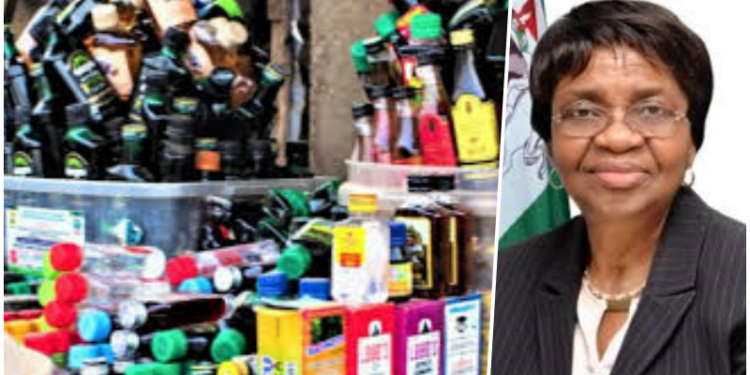- Experts, professionals express worry as consumption of sachet alcoholic beverages goes high
- Findings also reveal that alcoholic beverages breed alcoholism, chronic diseases
- NAFDAC gives January 2024 as deadline to phase out sachet alcohol beverages
For the greater part of one hour, Mrs. Roseline Nwachukwu has been sobbing seemingly uncontrollably.
She has been battling with futile efforts to control her emotion of lost, deprivation and childlessness as she received consolations and encouragement from Mr. Fred Nweke, owner of provision store where she has gone to buy some items.
It is now two weeks her only son, Jude Nwachukwu lost his battle with multiple organ failure arising from Alcohol Use Disorder (AUD) better known as alcohol addiction, or Alcohol Dependence Syndrome (ADS).
Until his death, the 41-year old Jude was a commercial motorbike operator popularly known as Okada, after dropping out from JSS 3 at Model Secondary, Nsukka, Enugu state.
Interestingly and ironically, despite knowing that Jude died as a result of alcohol addiction, his peers/contemporaries and most others consoled themselves by sipping dozens of both licensed and unlicensed alcoholic beverages as he was being committed to mother earth.
Jude Nwachukwu and Chijioke Ezugwu were too close friends living at Obukpa, Nsukka local government area of Enugu state.
Jude was a tricycle operator while Chijioke was a carpenter.
The two died three months apart, arising from complications as a result of alcoholism.

While Jude, a 41-year Ebonyi-state-born Keke rider left behind four children, Chijioke, 40 had two children.
On November 30, Jude was buried at their village in Izzi local government area of Ebonyi state.
According to the aged mother, for years, the family has been fighting to stop him from alcohol addiction which eventually claimed his life.
The obviously troubled mother narrated that several doctors at the hospitals have variously advised Jude to stay away from alcoholism if he really wanted to be alive; an advice he never took seriously.
“Jude is stubborn. He didn’t heed the advice of various doctors that we visited at various hospitals. They kept on telling him to stay away from alcoholism but he never heard. He would always tell you that he could not stay away from alcoholism. Look at it now. The same alcoholism has claimed his life, untimely.”
But while Jude may be lucky to have begotten some children before his untimely death, Nnabuike Ozioko of Nru Nsukka, Enugu state was not that lucky.
Nnabuike died after several months of battle with what initially seemed like poison.
Eventually, he was diagnosed of organ failure, resulting from chronic alcoholism.
He died childless, leaving behind an aged mother and two sisters who are already married.
The life story of Jude and Nnabuike is a clear illustration of grave consequences of alcoholism in Nigeria.
WITHIN NIGERIA findings showed that this ugly trend cut across all age and social spectrum with its attendant implications.
For instance, Jonathan is a commercial bus driver who plies from Holy Ghost to Ugwu Aji axis in Enugu state.
Every morning, he sips two sachets of alcohol beverages with two sticks of cigarettes before going out for the day’s work.
According to 47-year old Anambra-born Jonathan, the beverages and the cigarettes consumption helps him to “see clearly” while driving.
While commercial drivers like Jonathan continue to hold this erroneous belief that alcohol beverage and cigarettes consumption helps in “seeing clearly” while driving, they certainly don’t know the grave consequences of such belief.
Among all other consequences, medical experts say such habit could cause micro sleep, a situation where the driver takes about five to ten seconds nap while driving, a situation that may endanger the lives of both the driver and his passengers.
How sachet hot drink beverages breed alcoholism in Nigeria
Since the innovation of packaging water and alcoholic drinks inside sachets, there seemed to be upsurge in alcoholism in Nigeria.
Findings by WITHIN NIGERIA showed that many Nigerians who formerly and ordinarily were not indulging in alcoholism took to sachet alcoholics because it is packaged in small quantity, and so
would not lead to intoxication.
However, it was gathered many of such people ended up being alcohol addicts.
By and large, findings by WITHIN NIGERIA showed that usually when youths gather in most rural and urban locations especially for non-religious activities in most parts of the country, hardly will you see them without sachets of alcoholic beverages loaded in their pockets or pigeon holes in their vehicles.
Where they are without such, dealers in sachet alcoholic beverages, who are spread across most parts of the country are always on hand to make the supply chain seamless.
Worse still, even in many traditional and cultural occasions like traditional marriage, cultural day, ofala festival, burial ceremonies, funeral ceremonies and many of such occasions, alcohol beverage companies are usually part sponsors of such occasions with their products handy for the guests.

Again, recent findings by our reporter also revealed that vicinities and precincts of sensitive institutions including schools, hospitals, and government offices, as well as motor parks and garages where millions of youths make a living, are dotted with outlets selling and distributing all forms of alcoholic beverages, with little or no restriction from the authorities concerned.
Lack of National Alcohol policy and Health consequences of alcoholism
Experts define alcoholism as the drinking of alcohol to the point that causes problems, and continuing to drink even after problems arise.
The absence of a National Alcohol Policy, lack of standard drink measurements, or low-risk drinking guidelines (LRDG) in the country, stakeholders insist has impacted the country negatively despite the proliferation of industry-sponsored Responsible Drinking Message (RDM).
Till today, there is no clear legislation against alcoholism in Nigeria.
By and large, further manifestation of the negative consequences of the above, can also be seen from the 2023 World Health Statistics key messages on alcohol.
The so called statistics revealed that there is high rate of the abuse in Nigeria with its attendant implications.
Some of the dire health challenges brought about by alcohol abuse include liver cirrhosis, high blood pressure, mental health problems, violence and injuries, and poor productivity among others.
Matters are made worse by the fact that research by experts indicates that more than half (53 per cent) of Nigerians aged 15 years and above are alcohol consumers; 47 per cent are abstainers, a category that includes people who have never had any alcoholic drink and those who used to drink but stopped for religious, health or cultural reasons.
NAFDAC regulations on sachet alcohol drinks
In January, 2022 following the seemingly uncontrollable level of the proliferation, the National Agency for Foods, Drugs Administration and Control, NAFDAC, placed a ban on new registration for alcoholic drinks produced in sachet and small bottles with more than 30 percent alcohol by volume (ABV).
This is coming after recommendations by the committee of the federal ministry of health, NAFDAC and Federal Competition and Consumer Protection Commission (FCCPC) in December 2018.
In a statement released by the Agency to enforce the ban, no new registration will be entertained by January 2024.
The NAFDAC boss, Prof. Moji Adeyeye in a statement released said that the ban will take effect by January, 2024.
“In a decisive move to reduce availability and curb abuse of alcohol in the country, the National Agency for Food, Drugs Administration and Control (NAFDAC) has stopped the registration of alcohol in Sachet and Small volume PET and Glass bottles below 200ml amidst other stringent regulatory measures.
“The Agency will ensure that validity of renewal of already registered alcoholic products in the affected category will not exceed year 2024.
“The Distillers and Blenders Association of Nigeria was also given a marching order to embark on intensive nationwide sensitization campaigns against underage consumption of alcohol by adolescents below the age of 18 years in the bid to stem the tide of alcohol abuse in the country.
“Producers of Alcohol in Sachets and Small volume agreed to reduce production by 50% with effect from January 31st 2020 while ensuring the products are completely phased out in the country by 31st January, 2024.
“Even as we grapple with the containment of COVID-19 pandemic, NAFDAC is resolutely committed to the strict implementation of the regulations and regulatory measures towards safeguarding the Health of Nigerians, particularly the vulnerable youths against the dangers of reckless consumption of alcohol.”
While the country await the total ban on the registration and intake of the alcohol beverages in sachet drinks, it is still unclear how the youths and indeed the addicts will react to it.
But what is clear is that the nation is currently bearing the brunt of the alcoholism as millions of citizens fall victims to its dire consequences.




Discussion about this post